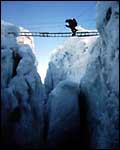
Simonson
| Expedition Dispatches Satellite phone updates from the 1998 American Everest Expedition |
 Simonson |
 Khumbu Icefall [click to zoom] (photo: Darsney) |
I think back on my last five Everest expeditions, on the friends I've lost, the other climbers I've see die, the close calls I've had, and it definitely makes you wonder if it is worth it. There is nothing like leaving home for a trip like this and putting all your affairs in order before you leave, just in case you don't come back. Every one of these trips is either the result of, or the cause of, some kind of major life experience, some good and some bad.
You just don't walk away from this mountain unaffected. I've had great experiences, some of the best in my life, and some of the very worst. At the same time, I've felt more alive and excited, more challenged and tested, than I ever felt doing anything else.
| Streaming Video Mystery of Everest |
|
 | |
REAL MEDIA modem speed (28k) (56k) (T1) RealPlayer |
|
modem speed (28k) (56k) (T1) NetShow |
In the big picture, there isn't much excitement in coming back to Everest for a sixth time. It is kind of deja vu, knowing that you have a bunch of hard work ahead of you and some serious risk. What makes this trip different for me is the chance to do some science and to participate in something different, which is sometimes hard to do these days. Doing something different is a natural creative instinct for all, or at least, most of us.
I was a geology major in college (Carleton, '77,) got a masters degree (UW, '81,) and worked in the profession a bit, before deciding I liked mountain guiding better. I have always considered myself something of a lay scientist and the idea of doing science in a place like this really fascinates me. I've read all the great adventure books and in particular liked to follow the exploits of the famous explorers and pioneers. I've often felt I was born a couple hundred years too late.
Now-a-days it is pretty hard to think up something new and unique to do, without it being just ridiculously lame. Even in the realm of guiding, it is hard to do new things. And if you do, getting credit is difficult. As an example, our 1995 Cho-Oyu team put 13 Americans on the summit of the world's sixth highest peak (and got them all home safe and sound — when only nine Americans had ever got to the top before,) but the American Alpine Journal refused to publish our one paragraph description of the expedition, because it was wasn't "unique" enough. I was really frustrated by this, as if having a safe and successful expedition wasn't good enough. These days, you either need to have a disaster or else be the "Environmental Save the Disabled Gay Whales Expedition" to get any coverage.
So, to make a long story short, what makes this 1998 Everest climb attractive is doing something different on a mountain that has been a huge part of my life for a long time. It's the kind of chance that just doesn't come around every day. If each trip was the same, it would be boring. I like coming back here again and again in different roles.
Over the years, I have been organizer, Expedition Leader, climbing leader, member, guide, and disposable climber for the more famous members of the team who had access to the Leader's Ear. Each one of the 20 Himalayan trips that I've done (and nearly 70 high altitude expeditions total) has been a complete finite life experience. Each one has a beginning and an end. Before you know it, they are over and its time to do something else.
A big part of this challenge from past trips has come from the organization and leadership roles that I have usually found myself in. Expedition climbing has become my job. The thousands of hours that I typically spend each year in my office, on the computer or phone, juxtapose with the time each year where I am out of the country and out of touch with my life. It is this total paradox that I find most intriguing.
This expedition is very different from any of the past trips that I have done. My organizational responsibilities are accomplished. Back in December, January, and February I packed food, sorted gear, and spent hours on the phone and computer tracking down loose ends.
This time out, I have team mates, but not clients. I am a team player, but ultimately, I am only responsible to myself. On one hand, this seems like the dream trip for me, on another, I feel somewhat empty without the feedback that I get from guiding. I like being a guide, and I get a certain energy out of it. I'll have to do without it this year!
In conclusion, I guess I feel somewhat focused and somewhat frazzled, champing at the bit to get my crampons on and to get at it. The waiting game is tough. Now at least I can get to it and see if I got what it takes.
— Eric Simonson, Climber
| DISPATCHES | |
|
|